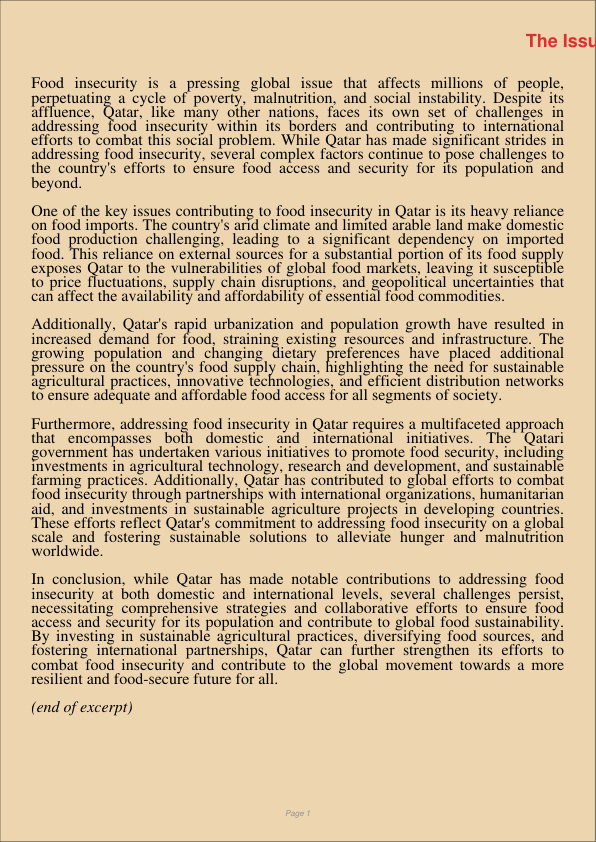The Issues Of Food Insecurity And The Contribution Of Qatar To The Social Problem
Dec 31, 2023
social problem
food insecurity
Education
Other
Food insecurity is a pressing global issue that affects millions of people, perpetuating a cycle of poverty, malnutrition, and social instability. Despite its affluence, Qatar, like many other nations, faces its own set of challenges in addressing food insecurity within its borders and contributing to international efforts to combat this social problem. While Qatar has made significant strides in addressing food insecurity, several complex factors continue to pose challenges to the country’s efforts to ensure food access and security for its population and beyond.
One of the key issues contributing to food insecurity in Qatar is its heavy reliance on food imports. The country’s arid climate and limited arable land make domestic food production challenging, leading to a significant dependency on imported food. This reliance on external sources for a substantial portion of its food supply exposes Qatar to the vulnerabilities of global food markets, leaving it susceptible to price fluctuations, supply chain disruptions, and geopolitical uncertainties that can affect the availability and affordability of essential food commodities.
Additionally, Qatar’s rapid urbanization and population growth have resulted in increased demand for food, straining existing resources and infrastructure. The growing population and changing dietary preferences have placed additional pressure on the country’s food supply chain, highlighting the need for sustainable agricultural practices, innovative technologies, and efficient distribution networks to ensure adequate and affordable food access for all segments of society.
Furthermore, addressing food insecurity in Qatar requires a multifaceted approach that encompasses both domestic and international initiatives. The Qatari government has undertaken various initiatives to promote food security, including investments in agricultural technology, research and development, and sustainable farming practices. Additionally, Qatar has contributed to global efforts to combat food insecurity through partnerships with international organizations, humanitarian aid, and investments in sustainable agriculture projects in developing countries. These efforts reflect Qatar’s commitment to addressing food insecurity on a global scale and fostering sustainable solutions to alleviate hunger and malnutrition worldwide.
In conclusion, while Qatar has made notable contributions to addressing food insecurity at both domestic and international levels, several challenges persist, necessitating comprehensive strategies and collaborative efforts to ensure food access and security for its population and contribute to global food sustainability. By investing in sustainable agricultural practices, diversifying food sources, and fostering international partnerships, Qatar can further strengthen its efforts to combat food insecurity and contribute to the global movement towards a more resilient and food-secure future for all.
